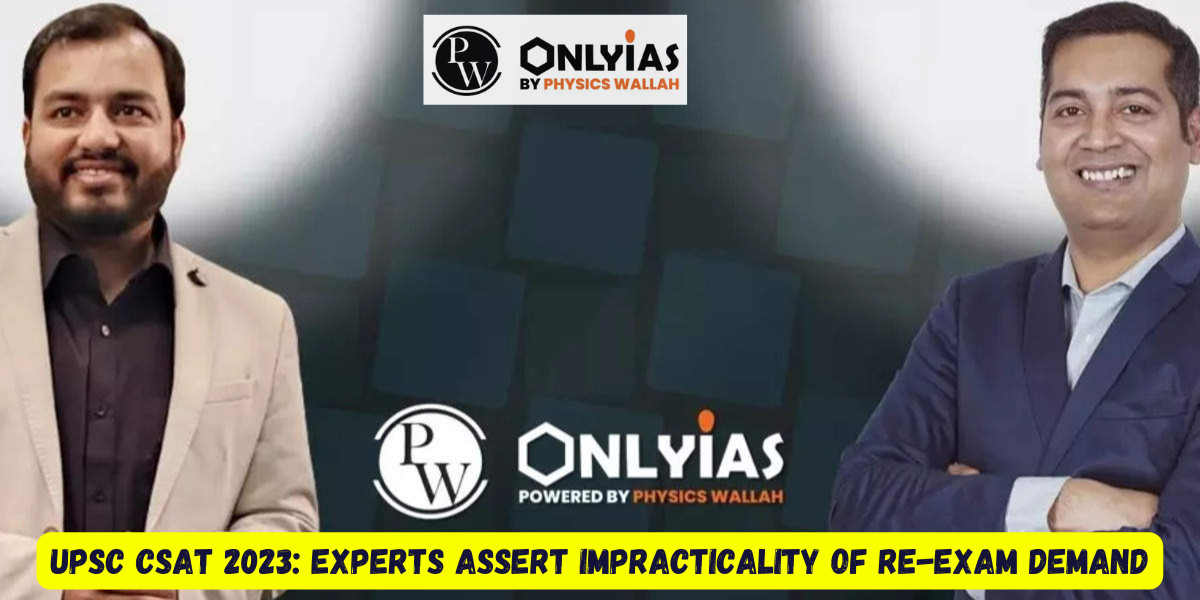
Since its inception in 2011, the Civil Services Aptitude Test (CSAT) has been consistently embroiled in controversies. Numerous candidates aspiring to join the UPSC (Union Public Service Commission) advocate for the exclusion of CSAT from the UPSC Civil Services Examination (CSE) pattern. The concerns raised by these students, referred to as the ‘Charter Of Demands By UPSC Aspirants,’ encompass a range of issues, including the proposal to lower the qualifying threshold for the UPSC CSE CSAT 2023 exam from 33 percent to 23 percent. Another request is to eliminate more than 25 questions that deviated from the prescribed syllabus, or alternatively, to re-conduct the UPSC preliminary exam for 2023.

Sumit Rewari, the CEO of Physics Wallah and Only IAS, remarked, that the demand to decrease the passing requirement for UPSC CSE CSAT 2023 from 33 percent to 23 percent holds significance. Nevertheless, it’s crucial to acknowledge that the 33 percent benchmark stands as a common passing criterion utilized across the Indian educational system.
“The demand to lower the qualifying criteria of UPSC CSE CSAT 2023 from 33 per cent to 23 per cent is a significant one. However, it’s important to note that the 33 per cent mark is a standard passing criterion followed throughout the Indian education system.” – Sumit Rewari (CEO, PW OnlyIAS)
The total number of available positions stays unchanged. As a result, it’s challenging to envision how the advantages of a reduced qualifying threshold will be apportioned among those who have successfully surpassed this year’s challenging exam, even though the difficulty level was high. A similar dilemma would emerge if the test is held again — it might be perceived as just for those who didn’t meet the cut-off but inequitable for those who did, elaborates a former IRS Officer.
The group of students who feel wronged has requested additional chances for those who were affected by the Covid-related disruptions. A number of individuals have called for extra opportunities for UPSC candidates who were eligible in 2020, 2021, 2022, and 2023. The pandemic prevented numerous students from taking the exam, causing them to exhaust their allotted attempts. This is why we are advocating for an extra attempt to be granted for all affected individuals. Certain universities have granted age relaxation and additional attempts due to the Covid situation. The question is: why hasn’t UPSC done the same?
According to Sumit Rewari, Many individuals who successfully passed the exam also encountered similar obstacles during the pandemic. While the demand is sympathetic, providing extra attempts might not be practically viable.
“Many students who cleared the exam also faced similar challenges during the pandemic. Therefore, while the demand is empathetic, it may not be practically feasible to provide extra attempts.” – Sumit Rewari (CEO, PW OnlyIAS)
A person preparing for the UPSC exam who chose to answer the paper in Hindi mentioned that there’s a problem with the preliminary exam paper. They pointed out that the questions are originally in English and are then translated to Hindi using apps. They believe that it’s important to create distinct questions specifically for Hindi medium students.
Another individual preparing for the exam also expressed their opinion, stating that the CSAT (Civil Services Aptitude Test) has turned into a tool for the UPSC to eliminate students from Humanities backgrounds and those with Hindi or regional language proficiency. Consequently, candidates from these backgrounds are placed at an unnecessary disadvantage during the examination.

Concerns have been raised by students regarding the age calculation process of UPSC. Those who are unhappy with this issue are requesting the option to consider the 1st of January as the reference date instead of the 1st of August. Additionally, they are calling for the elimination of the lateral entry scheme, which UPSC candidates argue promotes the privatization and contractualization of civil services.
Despite facing numerous challenges, these candidates put in substantial effort and struggle to compete in the challenging UPSC exam, all with the hope of achieving success. However, when confronted with a difficulty level comparable to that of this year’s preliminary exam, they felt that their hard work went to waste due to the seemingly arbitrary toughness of the test. What made matters worse was that this year’s preliminary exam paper intensified a sense of powerlessness among aspirants, causing them to feel betrayed by the system.
UPSC Prelims Syllabus 2024, Check General Studies & CSAT For CSE Prelims
<div class="new-fform">
</div>